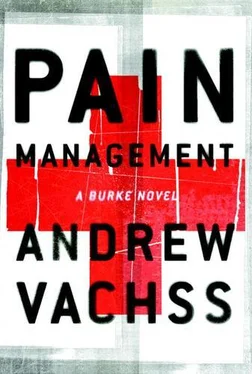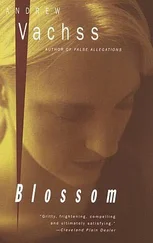“I’ve got enough money, pal.”
“All right, then. How about if I show you a crack in your boy’s game?”
“What kind of crack?”
“He’s still a kid.”
“So?”
“So let’s him and me play. Nine ball, like he’s been doing. A ten-spot per game. And I side-bet you a hundred I get him out of his rhythm before I drop the same amount.”
He leaned back in his chair and gave me a long look. “Big A doesn’t intimidate,” he said quietly. “Not with me around.”
“That’s not my style. What do you say?”
I refused to lag for break. It was his table; I figured I’d have a better chance with a coin toss.
“Rack them tight, ” I told the chubby little girl in a Hard Looks T-shirt. She nodded, tongue protruding in concentration.
Instead of breaking from the far end and stroking low to stop the cue ball near the center, I came off the side rail slightly off-center, striking high. It was a sucker move—good chance I’d leave myself snookered even if I pocketed a ball. But it was the best way to swing for the fences.
The cue ball attacked the rack, driving deep, compressing the balls until the yellow-and-white-striped nine popped out like a mouse out of a hole and squirted into the left-hand corner.
The kid just chuckled.
For the next game, I went to a more professional break. This time, I pocketed the seven in the corner and the one in the side, leaving myself clear on the two at the other end. I dropped it home. Then passed up a fairly easy line on the three in favor of a long combo to the nine. It didn’t drop.
The kid chuckled again. Too quickly. I’d left him a no-look at the three. He went two rails for the hit, but he couldn’t pocket anything.
My turn. I lined up on the three, whacked it hard with enough draw to come all the way back down the table, and almost kissed the nine ball in.
“Stroooke!” one of the young guys watching barked.
The kid nodded his head, on to my game now. He ran the table, pulling us even.
For the next hour, it went like that. I went slap-and-slam, kiss-and-combo, almost always playing the nine ball, no matter what was open. The kid played straight pool—one at a time, methodical. He should have been way ahead. He wasn’t.
And I was having a lot more fun.
Another hour. The kid started to take some chances. He had a beautiful stroke, but he hadn’t trained for extreme English on the ball. He was a little more accurate; I was a lot more radical. And the watching crowd was into radical.
After a while, the kid started to put more muscle into his breaks. A mistake—his game was finesse, not power. Twice, he scratched, leaving me easy. I vultured those racks . . . then broke even harder than I had before.
By two in the morning, the kid was tired. And playing more cowboy all the time. He was working the crowd, showing off, beating me at my own game . . . almost.
He was sixty bucks ahead when Clipper said, “Let’s get something to eat.”
“I’d like to play you again,” the kid told me. We were sitting in a diner, working on a nighthawk’s breakfast.
“He already played you, Big A,” Clipper told him.
“Yeah. But I—”
“ Played you, understand?”
“What?” the kid demanded, annoyed.
“You’re a lot better than me,” I said. “You should have wiped me out.” I was flat-out lying—the margin was actually pretty thin. But when you’re hustling, ego is the first thing you shed. “You know why you didn’t?”
“Sure,” he said, high-confidence, proudly reciting what he’d been taught. “A slop player can beat a pro any one time. That’s why nine ball is such a perfect sucker’s game. Luck can change the result. Sometimes. It’s the pool version of gin rummy. But over the long run, I’d always get your money.”
“Not the way you played,” I told him.
His fair complexion made the angry flush clear, even in the diner’s dim light. “My game—”
“You didn’t play your game, Big A,” Clipper said, gently. “That’s what Mr. . . .”
“Hazard.”
“. . . Hazard is trying to tell you, son. You got caught up in the crowd. Remember how you learned? Nine ball is nothing but one-rack rotation, right?”
“Yeah. I know. I was just—”
“I know what you were doing,” I told him.
“What?”
“You were having fun.”
“Huh?”
“People do things different when they do them for fun. The way you play, it’s work, right?”
“Sure. Me and Clipper—”
“I know. Thing is, it was fun, wasn’t it? Combos, kisses, heavy draw, billiard shots . . . slamming through on the break . . . ?”
“Yeah,” he said, flashing a smile.
“And we were playing for chump change, so you could relax, let the crowd get into it?”
“Maybe . . .” he admitted, grinning now.
“Only thing is, you can’t do that, Big A,” Clipper told him firmly. “You can’t do your work for fun. It changes your game. Those little things, they creep in around the corners when you’re not looking. Next thing you know, your edge is gone. Remember how many times we talked about focus ?”
The kid just nodded, solemn-faced now.
“It’s not your fault,” Clipper told him. “This guy”—nodding at me—“he conned you into it.”
“He won’t do it again,” the kid said. He turned to me. “Were you a pro, once?”
“I was a gambler.”
“What’s the difference?”
“A gambler plays all the time. A pro makes a living at it.”
“Heh!” The kid chuckled. “ We make a living. Well, maybe not yet, we don’t. But we will, right, Clipper?”
“Guaranteed.”
“What do you think?” he asked me.
I knew what he wanted. “In two, three years, if you stay inside yourself, if you practice only on pro-standard tables, if you listen to your father here . . . you’ll make your mark on the circuit.”
“How did you know Clipper was my father?” the kid demanded. “We’re not—”
“My family’s the same kind as yours,” I said.
Big A and Clipper looked at each other, then nodded a silent amen.
“Well?” I asked Clipper, while the kid was in the restroom.
“Fair enough,” he said. “You said you’d show me a crack. And you did.”
“It’s not a deep one. And it’s not permanent, either.”
“You’re right. You got a picture of the girl?”
I showed him what I had. He didn’t react . . . but I wouldn’t have expected him to, even if Rosebud’s face rang a bell.
“Here’s my card,” I said. “All I want is for you to ask her to give me a call. Twenty-four/seven.”
“She doesn’t know you?”
“No.”
“So why would she want to call?”
“Because I have a message for her. From her father. All she has to do is listen to it, then she can do whatever she wants; fair enough?”
“It’s not up to me.”
“I know.”
“We’ll ask around. If she does call you, don’t waste your time with a trace—it’ll be from right here,” he said, unhooking a cell phone from his belt and holding it up.
“The kid . . .”
“. . . Big A.”
“Big A. He’ll maybe know . . .”
“If he does, we’ll ask her. Don’t worry. Me and Big A, our word is gold.”
“You’re not just teaching him pool, huh?”
“I’m teaching him everything I know,” Clipper said.
Another thing Clipper knew was the address of a safehouse for kids trying to get off the street, or out of The Life. I knew the phone number; I’d seen it posted all over town. But the address was something else again.
Читать дальше











